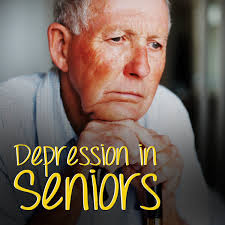As parents and grandparents age, many adult children (and seniors themselves) fear that their loved one will be diagnosed with dementia or Alzheimer’s, enduring years of cognitive decline and ultimately death as a result of the crippling disease. When we think of mental health issues in seniors, Alzheimer’s and dementia is at the forefront of our thoughts, conversations, and research. However, there is another silent killer that poses the biggest threat to senior mental health—depression.
Depressive disorders are the top mental health issue faced by seniors today, said gerontologist Patrick Arbore, EdD, director of the Center for Elderly Suicide Prevention and Grief-Related Services, a program of the Institute on Aging in San Francisco that he founded in 1973. Closely following are cognitive disorders (such as dementia and Alzheimer’s disease), anxiety disorders, and substance abuse disorders, respectively.
During this Covid-19 time of physical distancing, many older adults are feeling isolated, lonely, agitated, and withdrawn, reports the National Council on Aging, noting that those with underlying behavioral health conditions, such as depression, bi-polar disorder, schizophrenia, and previous substance use disorder are at higher risk for severe anxiety, relapse and thoughts of suicide. Click here to read NCA’s tips for managing your mental health during the pandemic.
According to the Center for Disease Control, between one and five percent of seniors living at home suffer from major depression; the numbers rise to about 14 percent for those who need home health care or are living in an assisted living facility. Those who have chronic diseases are more prone to suffer from depression. Although the rate of those affected increases with age, depression is not a normal part of aging and can be treated in 80 percent of cases. However, depression and other mental health issues are widely unrecognized and untreated among seniors.
With the holiday season quickly approaching, seniors may begin to experience seasonal depression, which often leads to further depression when untreated. A variety of factors can bring on the “holiday blues” – cold weather, shorter days, disabilities that prevent participation in holiday traditions, loneliness, isolation, loss of a spouse, etc. “The holidays are a time of tradition and the gathering of family and friends for many people,” said social worker Mary Stehle, LICSW. “For some seniors, this can be a time that reminds them of losses…the loss of loved ones, the loss of a home, and the loss of good health.”
If these symptoms continue to accumulate and worsen, it can lead to bigger issues, said Arbore. “Loneliness and isolation are such a concern among community-dwelling elderly,” he said. “If that milder depression isn’t recognized, it can get worse, for example, with the death of a spouse or adult son or daughter. That loss could trigger a major depressive episode.”
Arbore said the main reason depression so often goes untreated in seniors is because the value placed on independence makes it difficult to ask for help. “It’s going to make them less likely to say to somebody ‘I haven’t been sleeping that well,’ ‘I’m not making good decisions,’ or ‘I’m not eating very well,’” Arbore said. “That would normally trigger a question about, ‘Hey, what’s going on?’ But often – even if they are aware that something has been changing – they still won’t ask for help.” He also pointed out that many seniors don’t know who to ask for help, and may not see the need for a specialist, like a geriatrician.
So how do we fight elderly depression? Arbore said some crucial needs include mental health specialists for seniors and awareness among family, caregivers, and the healthcare industry of the signs of depression and how to treat it. The following are some signs that a senior may be suffering from a mental health concern, such as depression:
- Persistent sadness
- Trouble falling asleep or sleeping too much
- Decreased socialization
- Loss of interest in usual activities
- Excessive worrying
- Irritability
- Feeling worthless, helpless or hopeless
- Changes in appetite
- Crying spells
- Trouble focusing, remembering or making decisions
As part of Mental Illness Awareness Week Oct. 4-10, we can help seniors living with mental health issues like depression by continuing to raising awareness of the issue, educating the public, providing support, and replacing the stigma of mental illness with hope. Know that you can reach out to an Amada Senior Care advisor to ask about assistance and available resources.
Visit us today @ www.amadamesa.com
Amada Senior Care provides quality private care and assist with Long Term Care Insurance Management. Call Amada Senior Care at 480-999-5250 to schedule an assessment today! Say "I saw you in SPOTLIGHT!"



No comments:
Post a Comment